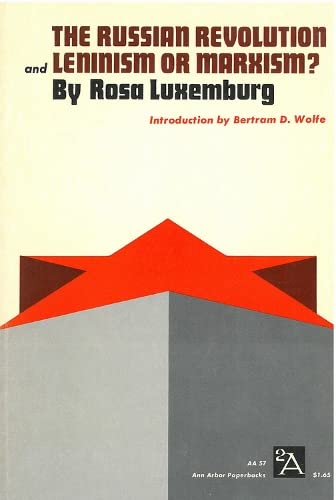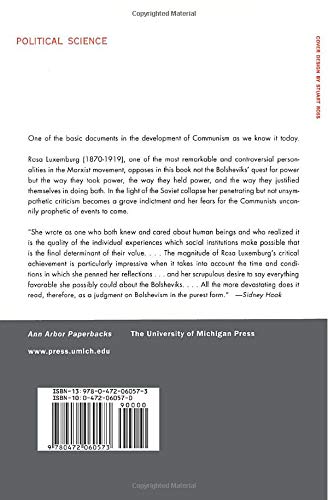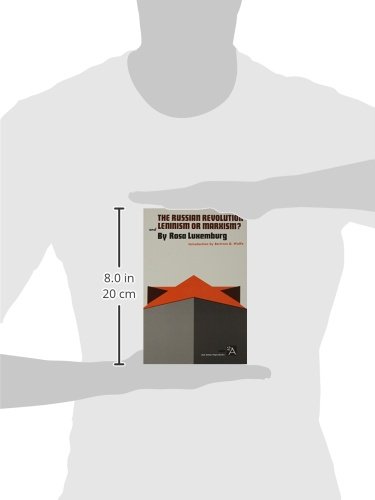



Full description not available
E**E
A book as complicated as its author, with arguments to justify many interpretations
This is effectively two long articles combined in one small book, and re-reading it after many years, I can now understand it in a different light than before.Rosa Luxemburg has been claimed by many competing left groups ranging from moderate Social Democrats to Trotskyists and Stalinists. The essays here provide arguments for all sides. For example, the uncompleted book that constitutes ‘The Russian Revolution’ is full of praise for Lenin and the Bolsheviks. And its criticisms largely come from the left, not the right. Luxemburg opposed early Bolshevik decisions to give land to the peasants (she proposes a kind of collectivization instead). And she absolutely detests the Bolshevik decision to support the right of nations to self-determination. (On this later point she had a history: she was an opponent of Polish independence even as leader of one of Poland’s Social Democratic parties.)But she also comes down hard on the Bolsheviks for their decision to disperse the elected Constituent Assembly in early 1918, and for their refusal to guarantee freedom of the press and the right to assembly. It’s a mixed bag, and it’s incomplete. There are many “notes to self” throughout.The second article was written a decade and a half earlier and it is Luxemburg’s answer to Lenin’s proposals regarding the structure of the Russian Social Democratic Party. Lenin was advocating a kind of ‘ultra-centralisation’ which Luxemburg opposed. She was far more convinced that the masses on their own could create the revolution without the help of an all-powerful, all-knowing Central Committee. The last line of the book has become very well known: ‘Historically, the errors committed by a truly revolutionary movement are infinitely more fruitful than the infallibility of the cleverest Central Committee.’A book as complicated as its author, with arguments to justify many interpretations — but recommended reading nonetheless.
S**S
Excellent
Excellent
M**U
Lenninism or Marxism
Quite pleased overall with the service and the produc: speedy delivery and book was in excellent condition.
N**L
History - Real and Fictitious
Rosa Luxemburg's reputation rests on two things. The first was her understanding that Lenin's form of "socialism" (democratic centralism) was undemocratic. The second was her murder when she joined in the attempt to overthrow the Weimar Republic in 1919. Recently, attempts have been made to rehabilitate Luxembourg as socialist theorist whose ideas are applicable both to the globalised international economy and feminism. Such attempts will inevitably fail. As Betrand Wolfe points out much of what she wrote "is now hopelessly dated, for much of it stems from dogmas which would not bear examination and have not resisted the passage of time." Luxemburg's attachment to Marxian economics stunted her intellectual development and prevented her from examining contemporary political issues outside her perception of Marx's faulty framework. It is also ironic that those who see her as a feminist are refuted by her own assertion that she and Clara Zetkin were the only two men left in the German Social Democratic Party.Luxemburg's doctrinaire approach produced an analysis which dismissed the revisionist ideas of Bernstein. She understood that, "Either revisionism is correct in its position on the course of capitalist development, and therefore the socialist transformation of society is only a utopia, or socialism is not a utopia, and the theory of "means of adaptation" is false." However, she could never bring herself to abandon the Marxist shibboleth of the "class consciousness of the proletariat" even after Lenin abandoned the pretence that the proletariat had the capacity to think for themselves. When the outbreak of World War One showed the paucity of the view that workingmen have no country Luxembourg contemplated suicide rather than acknowledge the shortcomings of "socialist" thought. Luxembourg argued for peace, Lenin argued for continuance of war until the old order was finished then continued as a universal civil war. She would have restored a reformed Second International, he established the Third International to subject "revolutionary socialism" to his control.Lenin's argument was that spontaneous proletarian action did not enable it to fulfil its historic mission. Instead it subordinated the proletariat to bourgeois ideology. Socialist consciousness could only be brought to the proletariat from the outside by their educated representatives, a classless elite who would form the vanguard for the working class. It would inject "into the working class its own consciousness of that class's "historic mission." Luxembourg rejected Lenin's implicit contempt for the working class, his idea of centralism and his rejection of spontaneous revolution. She wanted socialism to be introduced with the widest possible democracy and freedom. She recognised that Lenin's "socialism" would lead to the bureaucratic suffication of the revolution and the installation of abusive authoritarianism.This was not a new criticism, the same argument had been used by Bakhunin who wrote that Marxists " maintain that only a dictatorship--their dictatorship, of course--can create the will of the people, while our answer to this is: No dictatorship can have any other aim but that of self-perpetuation, and it can beget only slavery in the people tolerating it; freedom can be created only by freedom, that is, by a universal rebellion on the part of the people and free organization of the toiling masses from the bottom up." When faced with that reality Luxemburg (and anti-Stalinist Marxists ever since) bottled out of the conclusion that Marxism and democracy were incompatable.Luxemburg traced the political roots of revolutionary Marxism back to the English Levellers and the Great French Revolution. In fact, many Bolsheviks saw the Russian Revolution as the fulfilment of its French predecessor. Luxemburg misread contemporary politics, believing the masses had brought down the Kaiser when, in fact, it was the desertion of the military. Luxemberg and her Spartacist collegue Leibknecht helped form the German Communist Party at the end of December 1918. She voted for the Party to take part in the Weimar National Assembly but was outvoted.In similar fashion she opposed the Party's decision to seize power in Berlin. On January 7, 1919 she wrote, "The masses are the real power, the actual power, by virtue of the iron compulsion of history." She argued, "The whole political significance and historical content of the crisis......lies precisely in the fact that the revolution is being driven forward by its inner force and logical development to bring about the proletariat's conquest of power, the realization of socialism, even though today oppositional factors dog its every step. Should these oppositional forces gain the upper hand for the moment by means of crude force, they will nonetheless be powerless to restrain the further course of development, the victory march of the revolution." She was wrong because there was no victory march or for that matter iron compulsion of history. The Weimar Republic took Leibknecht and Rosenburg at their word, moved against them with military force and ended the German revolution.This book is an historical curiosity which was originally published at the height of the Cold War. While it provides interesting observations on sterile debates about Marxist dogma it is, in essence, bound by its time and place. Its contents can be found at several places across the internet but for those who prefer the written word in book form this provides a clear demonstration of the abject nonsense of Marxist mythology. Three stars.
Trustpilot
2 weeks ago
1 day ago